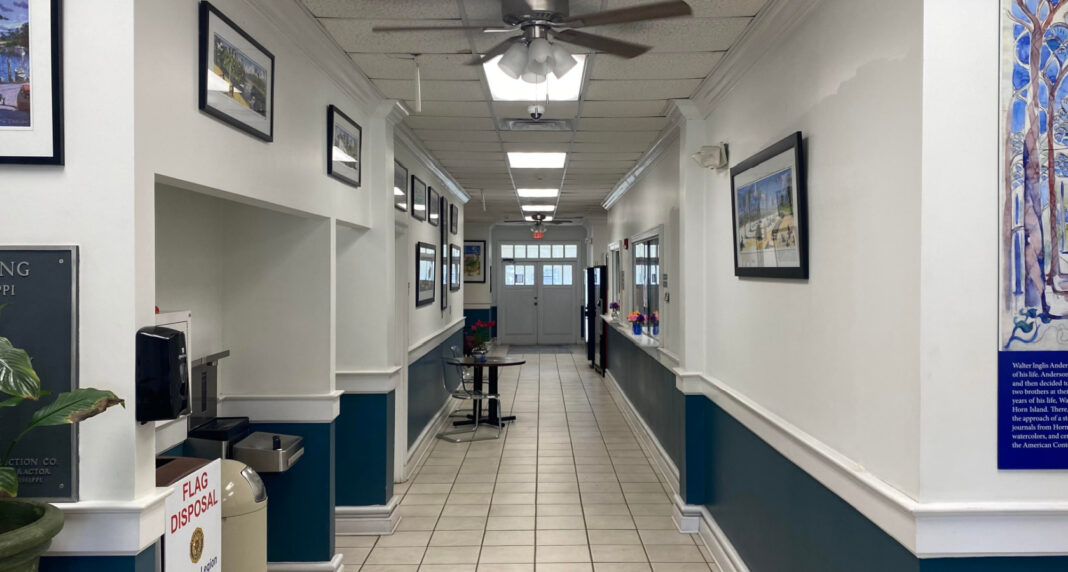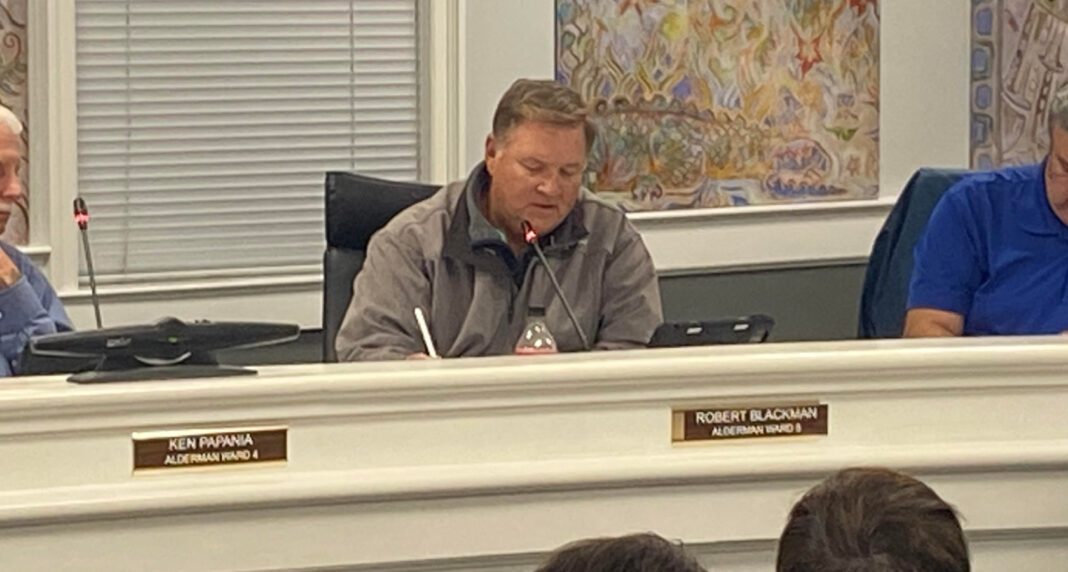OCEAN SPRINGS, MS – For more than three years, the City of Ocean Springs has secretly recorded residents inside City Hall — capturing private conversations on government property without a single sign posted and without anyone’s consent. City officials say it’s for safety, but the law says it’s illegal and might even constitute a felony.
Many folks had heard the rumors that hidden microphones were peppered throughout the hallway of City Hall – the area where residents gather before and after Board of Aldermen meetings to have private discussions. Results of a public records request confirmed the rumor to be fact.
It feels casual. It feels private. But it’s not.
Every word spoken in that hallway is being recorded.
Last week, GC Wire submitted a records request that inquired about the system. That request resulted in the city verifying the existence of the audio recording devices and that no policy is in place regarding which employees are able to access the files. The city also confirmed there is no list or log of who has listened to the recordings.
In most cases, legal issues would be satisfied by posting signs informing the public of audio monitoring. But at Ocean Springs City Hall, there are no signs. No warnings. Just Big Brother watching — and listening.
The surveillance system was installed in October 2021, just months after Mayor Kenny Holloway took office.
City Says It’s for Safety – State Says It’s Illegal
City Clerk Patty Gaston says the devices exist for safety reasons. She told GC Wire there are several audio and video devices, but the clearest one – the one where you can hear conversations distinctly – is located just outside the water department window. That happens to be the place where residents gather to converse before and after Board meetings – complete with table and chairs.
“You can hear real well from the one by the water counter,” Gaston said. “It’s for the water customers, because we’ve had people come in there and act up real bad because their water got cut off.”
Board of Aldermen meetings take place in the evening hours, after the water department closes. When asked why the listening devices remain operational well after 5pm, Gaston responded, “Well, they don’t go up and down – we don’t turn them on and off.”
If safety is the reason for recording audio, simple signage alerting water department customers and other residents that they are under audio surveillance would not have a negative impact on the goal.
When it comes to listening devices, state law is clear. The act of recording third parties, without letting them know or getting their consent, is not allowed.
Under Mississippi law, it is illegal to intercept or record oral communications unless at least one party to the conversation consents. When city officials install a surveillance system to record residents who are not speaking to the city, and retain those recordings, they may be violating the state’s criminal wiretap statutes. Government employees acting under the color of law are not exempt from the statutes.
The penalty? Mississippi law allows for incarceration and hefty fines.
There are federal issues, as well. The Fourth Amendment to the Constitution protects the privacy rights of citizens and shields them from unlawful search and seizure. As residents become aware of the listening devices, it may also cause a chilling effect on speech, raising First Amendment issues.
The Supreme Court has held that, even in public places, there is a reasonable expectation of privacy in regards to conversations. In other words, it’s against the law to bug a room without a warrant – even if that room is at City Hall.
Ocean Springs isn’t the first city to get caught.
In Green Bay, Wisconsin, a nearly identical scandal unraveled when residents discovered their city had been secretly recording conversations in and around council chambers. That city also claimed the devices were for safety reasons.
A lawsuit was filed by two citizens and Wisconsin Senate Majority Leader Devin LeMahieu, who alleged illegal wiretapping. After a media storm, the city eventually voted to stop recording citizens and the lawsuit was settled out of court — with the city paying hundreds of thousands of dollars to the three plaintiffs.
If any residents here decided to take action, Ocean Springs could be headed for the same legal cliff.
Local Reactions
When GC Wire alerted the public of the situation via a Facebook post, reactions varied – with some residents angered and others defending the practice.
“The paranoia of despots,” Matthew Nielson wrote, referring to the officials who had the system put in place.
“1943 Germany,” Steven Tanner wrote, comparing the practices to those of the Nazi regime.
Bonnie Munro, a city official who serves as president of the Ocean Springs Historical Commission, sent mixed signals. “No one should be recorded without their knowledge,” she began with, before stating it may be okay under certain circumstances. “If these recordings are being used to intimidate, harass or anything similar then I would have a BIG problem with that. But to be told that the hallways of our city hall are being recorded doesn’t really anger me unless there is more to it.”
Randy Wrigley, a frequent commenter of city affairs, also offered a dual sided reaction. “I am not for anyone secretly recording a conversation,” he posted, before suggesting the unannounced listening devices might be alright if not used for nefarious purposes. “I do want to see solid proof this has been done at city hall for purposes of listening to the conversations of citizens that take place outside of the meeting room if it exists,” he added.
One resident chose to attack the messenger rather than address the issue of potential wiretapping, accusing GC Wire of “stirring the sh*t” before resorting to a bigoted jab. “Another big-nosed East Coast hired hatchet man,” Marc Masengale wrote — a comment that many would recognize as a classic antisemitic trope aimed at this reporter’s Jewish background.
When facts make people uncomfortable, deflection often turns personal – and ugly.
Private Conversations For Sale
The way the system is set up, anyone can join in on the unlawful spying. If someone observes a group of people talking in the hallway, they can file a public records request to acquire the video and audio of that conversation.
We tested the theory by filing a request for nine minutes of footage immediately following the May 20, 2025 Board of Aldermen meeting. The city responded with a price: “There is a $50/hour fee to pull video footage. Our video service company has estimated that it will take 1.5 hours to pull the requested footage for a fee of $75 + $10 fee for the USB storage drive + $1.00 Records Management fee.”
What the City Must Answer For
Ocean Springs officials may try to dismiss the surveillance as a harmless security measure, but the facts — and the law — say otherwise. Recording conversations without consent, in a public building with no posted notice, is not just questionable policy. It’s potentially criminal.
Mississippi’s wiretap statute carries a penalty of up to five years per violation. And under the Fourth and First Amendments of the U.S. Constitution, recording private conversations without a warrant or warning can expose public officials to serious civil liability.
At minimum, the city must answer why:
- No signage was ever posted to alert residents of live audio monitoring;
- No policy exists outlining who can access recordings and for what purpose;
- No logs are kept showing when the footage is pulled and by whom;
- And why, after the water department closes at 5pm, the listening devices remain operational — precisely during the hours when residents gather to discuss local government business.
Ocean Springs now finds itself in dangerous legal territory — and the more officials justify inaction, the steeper the drop.


I can see having an audio and video security system in a city building but that’s different than 24/7 monitoring. With security systems, you activate them when the building is not occupied and have panic buttons for employees to turn them on during working hours if needed. Usually with a loop of a minute to catch anything important that may have caused the panic button to be used. These systems usually automatically purge or “tape over” after a set time (a week or 30 days) if nothing happened that needed to be reviewed or saved.
This sounds like it is primarily used to monitor and record conversations and no purging takes place. Without policies in place and logs you never know who reviewed them or downloaded and copied conversations (or even erased embarrassing recordings).
Where was the city attorney on this? Seems like some expert legal advice could have helped here.
A city law cannot overide a state law nor can the city make something legal that the state forbids. Video security without audio would be fine but when you add audio, you are listening in on private conversations. What happened to the right to privacy?